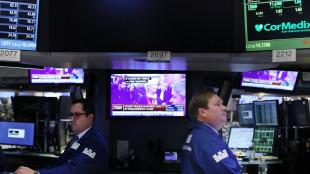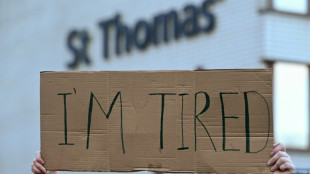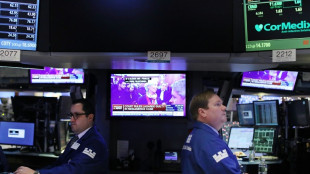
| RBGPF | -5.05% | 59.02 | $ | |
| CMSC | 0.93% | 23.145 | $ | |
| CMSD | 1.09% | 23.384 | $ | |
| AZN | 0.6% | 65.915 | $ | |
| SCS | -0.9% | 11.715 | $ | |
| NGG | 0.45% | 59.69 | $ | |
| RELX | -0.24% | 45.31 | $ | |
| GSK | 0.22% | 33.895 | $ | |
| RYCEF | 2.34% | 7.25 | $ | |
| JRI | 0.12% | 12.145 | $ | |
| BCC | -1.21% | 117.44 | $ | |
| RIO | -0.17% | 58.71 | $ | |
| BCE | 0.11% | 23.205 | $ | |
| VOD | -0.01% | 8.489 | $ | |
| BTI | 0.33% | 36.44 | $ | |
| BP | 0.89% | 29.825 | $ |

Germany's embattled Scholz paves way for early elections
German Chancellor Olaf Scholz said Wednesday amid a deep coalition crisis that he will seek a vote of confidence in January that would pave the way for early elections by March.
He spoke after firing his rebellious Finance Minister Christian Lindner in a dramatic night session at the chancellery, declaring there was no longer any "basis of trust".
Scholz said he planned to ask for a vote of confidence by January 15 so that MPs "can decide whether to clear the way for early elections" which could be held by the end of March -- six months earlier than scheduled.
He bitterly attacked Lindner's "petty political tactics" and accused him of a level of egoism that is "completely incomprehensible".
Scholz cited the re-election of Donald Trump to the White House, Germany's economic woes and the war in Ukraine as reasons for why Europe's top economy now needs political certainty.
"We now need clarity on how we can soundly finance our security and defence in the coming years without jeopardising the cohesion of the country," he said.
"With a view to the election in America, this is perhaps more urgent than ever."
Scholz fired Lindner during a crunch meeting of senior figures from all three ideologically disparate parties at the chancellery, Scholz's spokesman Steffen Hebestreit told AFP.
- 'Worst time' -
Fiscal hawk Lindner had proposed sweeping reforms to jumpstart the troubled German economy that the other two parties opposed, and had long flirted with bolting the unhappy coalition.
Lindner had repeatedly warned of "an autumn of decisions" as difficult budget talks have loomed.
With the German economy expected to shrink for the second year in a row, Lindner has demanded widespread measures, including corporate tax cuts, eased climate regulations and a reduction of social benefits.
Many of those ideas are anathema to Scholz's SPD, Germany's traditional workers' party, and the left-leaning Greens of Vice Chancellor Robert Habeck who is also economy and climate minister.
The bitter dispute has in recent weeks seen Scholz, Lindner and Habeck present contradictory economic plans and hold rival meetings with business leaders, deepening the sense of dysfunction and weakening Scholz's authority.
Habeck had warned that the US presidential election and the Ukraine and Middle East wars make this "the worst time for the government to fail".
The Green's Foreign Minister Annalena Baerbock said the turmoil in Berlin meant "this is not a good day for Germany and not a good day for Europe".
The Bild daily reported that Lindner had argued inside the tense meeting that Trump's election victory had made an economic turnaround even more urgent.
It added that Lindner had suggested that the parties jointly opt for new elections in early 2025, but that Scholz had rejected the proposal.
Amid the disarray, Scholz had for days urged pragmatism over ideology from his two junior coalition partners and told them: "If you want to, you can reach an agreement."
After congratulating Trump, he pointed to the divisive US election campaign and made a broad appeal for German unity.
"We may have different political and social views, but we live in one country," he said. "There is more that unites us than divides us."
Scholz and his mutinous coalition partners have drawn withering fire from opposition leader Friedrich Merz of the CDU, who has long demanded early elections in which polls suggest he would be the frontrunner.
"We cannot afford to argue for another year," CDU lawmaker Norbert Roettgen said after Trump's victory and before the evening crisis talks brought the political drama to a head.
"Germany is important in Europe, and if the government can't live up to that, then it must make way now."
I.Servais--JdB



